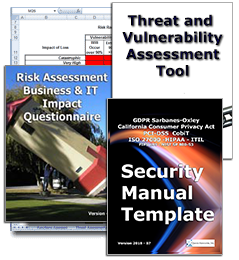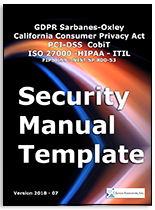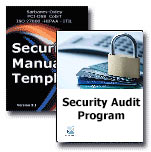Meaningful Use Stages - HITECH Requirement
Security Manual Template Supports Meaningful Use Compliant Stage Implementation
Order Security Manual Template Download sample Version History
Electronic Health Records Standards Updated for Meaningful Use Requirements
Meaningful Use Stages - HITECH Requirement - Meaningful use is the set of standards defined by the Centers for Medicare & Medicaid Services (CMS) Incentive Programs that governs the use of electronic health records (EHR) and allows eligible providers and hospitals to earn incentive payments by meeting specific criteria. For details about the incentive programs. Doctors and health care provides qualify for financial rewards if they meet these requirements. With these standards in place there is and will continue to be an increase in security of all EHR records.
Order Security Manual Template Download Sample
Securing EHRs and operational infrastructure demands an end-to-end approach with a firm grasp of vulnerabilities and associated protective measures. While such knowledge cannot stop all attempts at network incursion or system attack, it can empower IT professionals to eliminate general problems, greatly reduce potential damages, and quickly detect breaches.
Security is a major issue with as the goals of meaningful use to promote the spread of electronic health records to improve health care in the United States are implemented.
The benefits of the meaningful use of EHRs include:
- Complete and accurate information. With electronic health records, providers have the information they need to provide the best possible care. Providers will know more about their patients and their health history before they walk into the examination room.
- Better access to information. Electronic health records facilitate greater access to the information providers need to diagnose health problems earlier and improve the health outcomes of their patients. Electronic health records also allow information to be shared more easily among doctors' offices, hospitals, and across health systems, leading to better coordination of care.
- Patient empowerment. Electronic health records will help empower patients to take a more active role in their health and in the health of their families. Patients can receive electronic copies of their medical records and share their health information securely over the Internet with their families.
Stage 1 Implementation of Electronic Health Records (2011-2012)
- Electronically capture health data in a standardized format
- Share the electronic data for patient care
- Coordinate the reporting of quality measures and public health information
- Use electronic records with patients and related parties
Stage 2 Advanced Clinical Process (Due 2014)
- Communication and transmission of electronic records
- Improved use of the health information exchange (HIE)
- Ability for patients to control data
Stage 3 Improved Outcomes (Due 2016)
- Improved EHR for quality, safety, and efficiency
- Integration into national data
- Patient sell management tools
- Patient centered HIE
The Health Information Technology for Economic and Clinical Health (HITECH) Act provides the Department of Health & Human Services (HHS) with the authority to establish programs to improve health care quality, safety, and efficiency through the promotion of health IT, including electronic health records and private and secure electronic health information exchange.
 Under HITECH, eligible health care professionals and hospitals can qualify for Medicare and Medicaid incentive payments when they adopt certified EHR technology and use it to achieve specified objectives.
Under HITECH, eligible health care professionals and hospitals can qualify for Medicare and Medicaid incentive payments when they adopt certified EHR technology and use it to achieve specified objectives.
Four regulations have been released, two of which define the "meaningful use" objectives that providers must meet to qualify for the bonus payments, and two of which identify the technical capabilities required for certified EHR technology.
- Incentive Program for Electronic Health Records: Issued by CMS, these final rules define the minimum requirements that providers must meet through their use of certified EHR technology in order to qualify for the payments for Stages 1 and 2 of meaningful use.
- Standards and Certification Criteria for Electronic Health Records: Issued by the Office of the National Coordinator for Health Information Technology (ONC), these rules identify the standards and certification criteria for the certification of EHR technology, so eligible professionals and hospitals may be assured that the systems they adopt are capable of performing the required functions.
Security Manual - Comprehensive, Detailed, and Customizable
The Security Manual is over 240 pages in length. All versions of the Security Manual Template include both the Business IT Impact Questionnaire and the Threat Vulnerability Assessment Tool (they were redesigned to address Sarbanes Oxley compliance).
Order Security Manual Template Download Sample
Data Security and Protection are a priority and this template is a must have tool for every CIO and IT department. Over 3,000 enterprise worldwide have acquired this tool and it is viewed by many as the Industry Standard for Security Management and Security Compliance.
Security Manual Template supports "Meaningful Use" reqirements
Order Security Manual Template Multi-Country License Download sample







